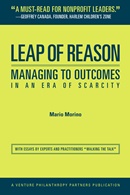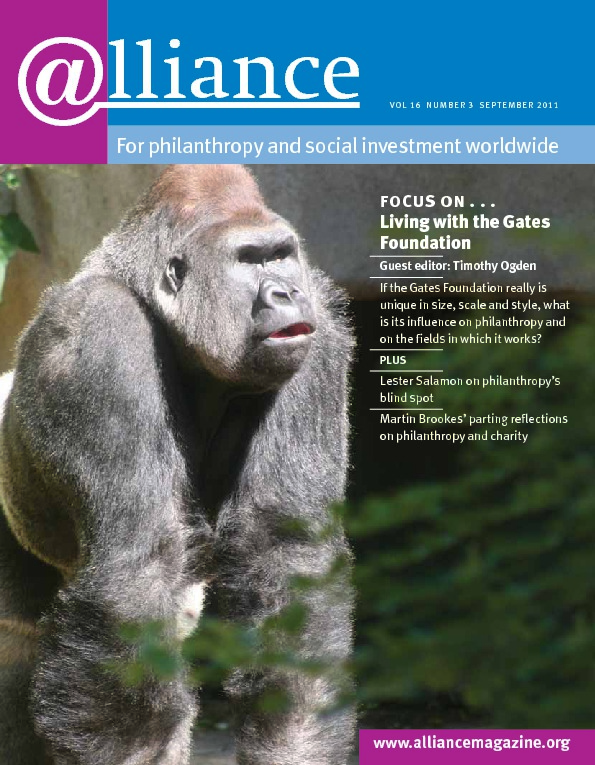 I’m an evangelist about charities measuring their results – a signed-up, card-carrying member of the impact brigade. But from time to time, I admit I have doubts about whether the increasing interest in measurement among charities and social enterprises is really translating into greater impact: more people’s lives being changed more significantly and deeply entrenched social issues getting solved.
I’m an evangelist about charities measuring their results – a signed-up, card-carrying member of the impact brigade. But from time to time, I admit I have doubts about whether the increasing interest in measurement among charities and social enterprises is really translating into greater impact: more people’s lives being changed more significantly and deeply entrenched social issues getting solved.
So Mario Morino’s recent book Leap of Reason was a breath of fresh air to me as it addresses this worry head on. Morino has been one of the leaders of the impact measurement movement for many years – as chairman of Venture Philanthropy Partners he has invested in non-profits, in part to increase their capacity to measure their results.
Among those who do try to measure outcomes, he says, ‘far too many are missing the forest for the trees. They focus more heavily on the mechanics of measurement than on understanding what the data reveal. As a result, they are squandering precious time and financial resources. I fear when it comes to outcomes assessment, we have failed to keep our eyes fixed on the ends we are trying to advance.’
Part manifesto, part handbook, Leap of Reason attempts to redress the balance and encourages charities and funders to shift their efforts away from purely mechanistic efforts to measure impact towards ensuring that they achieve their aims.
The book starts with Morino laying out his view of the social sector and where it’s going wrong in its efforts to assess outcomes. Non-profits, he says, don’t generally ‘manage to outcomes’ – meaning that they don’t manage their performance against the aims they are trying to achieve. This problem is more urgent than ever, he argues, as funders start to tighten their belts and are undoubtedly going to be looking for greater bang for their buck.
So what is Morino’s prescription for charities trying to get to grips with their impact? First, it’s to start with ‘clarity of purpose’ by focusing on what you’re trying to achieve, and to be specific about how you might get there. Second, to make sure you have the ‘performance culture’ in place that will allow you to learn from the data and analysis you will generate by measuring your results. Only then, once these foundations are laid, can you start working out the how and what of measuring results.
If you hadn’t guessed already, I love this book. It says things that really need to be said if charities are to fulfil their promise and help tackle the problems society faces. It says them clearly, and with passion, conviction and insight based on deep experience. And it delivers on the practical challenge too – because when it comes to measuring results and managing outcomes, all the theory and encouragement in the world is worthless if you can’t work out how to put it into practice.
I don’t say this because I’ve got a signed copy, or because I’m quoted in the book – though I will confess to being biased. I say it because I believe that charities that can manage to outcomes can be part of a radically improved society. And that charities that can’t represent wasted potential, just as those that fund them represent wasted potential in philanthropy.
But before you head off to buy this book, I do have one criticism. I think it underestimates how much work a chief executive needs to put in to get funders to support a charity’s journey towards managing to outcomes. Today 95 per cent of charities’ efforts to measure results aim to satisfy funders. That’s why we are seeing such an increase in activity on impact by charities: they see impact measurement as a means to the end of accessing funding.
But for charities to progress on Morino’s journey, their efforts to measure results have to be driven from within, not just to meet funders’ requirements: ‘The non-profit needs to drive the outcomes-assessment process and be the primary beneficiary of it.’
Making this leap, from measurement driven by funders to measurement driven from within, requires a true leap of faith. A leap by the charity’s board to say that it’s worth the investment of time and money to build a new approach to impact. And a leap by the chief executive to believe that this new framework will reap rewards – first in increasing its impact by managing better, and second in bringing in funding based on results.
Morino is a highly respected figure in the world of non-profit leadership and venture philanthropy. Ultimately, if we are to make his vision a reality, we need him and others to take the challenge to funders – foundations, governments, philanthropists – to provide the right kind of support to enable those they back to make that leap.
Tris Lumley is Head of Development at New Philanthropy Capital. Email TLumley@philanthropycapital.org
Leap of Reason: Managing to outcomes in an era of scarcity
Mario Morino Venture Philanthropy Partners pdf
ISBN 9780983492009
To order
http://www.leapofreason.org





Comments (0)